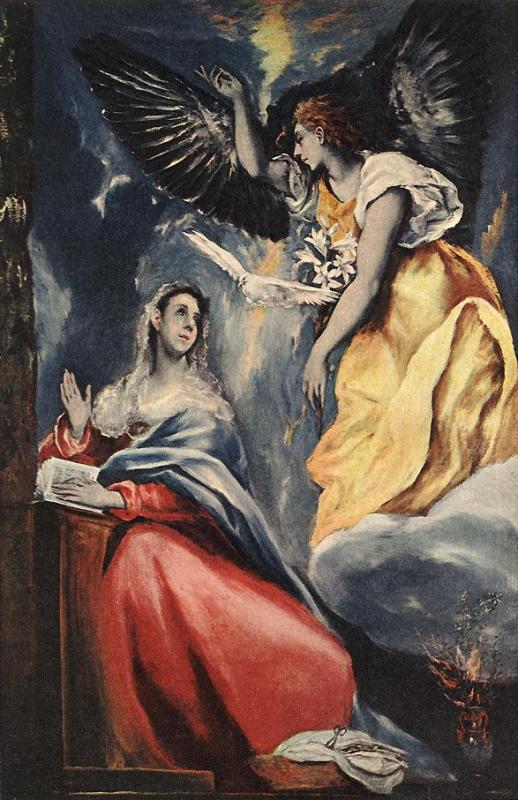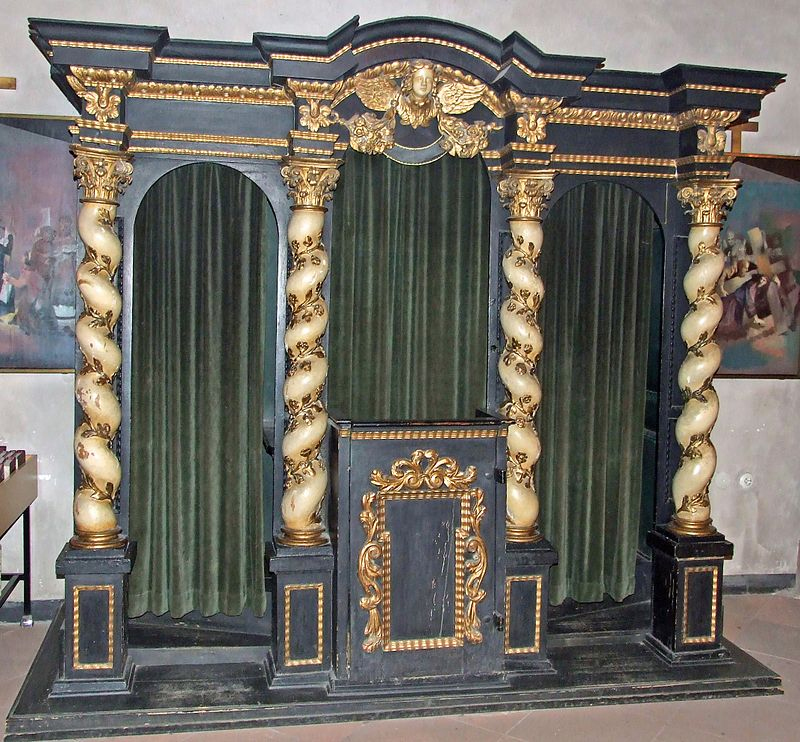1. From ten-year old Abe: ‘My (non-Catholic) teacher says that we do not pray to the saints. How come I saw a card saying, “PRAYER TO Saint Michael”?’

The Annunciation, El Greco, 1600s
Toledo Museum of Art, Toledo, Ohio [Web Gallery of Art]
The painting above by El Greco shows two of God’s creatures, the Blessed Virgin Mary and St Gabriel the Archangel. God decided to become one of us in the person of Jesus Christ, God the Son who became Man. Jesus spent nine months in the womb of his Mother. God the Father didn’t send Jesus ‘ready-made’. Nor did God choose to speak directly to Mary. He spoke to her through the Angel Gabriel. Yet God the Father was clearly sending Jesus Christ his Son, God who became Man, to us – but through Mary. And clearly God was speaking to Mary – but through St Gabriel.
Prayer to Mary and to the saints is a bit like that in reverse. We can pray directly to God if we wish. And in the Holy Sacrifice of the Mass, our most important prayer, we always pray directly to the Father, through Jesus Christ his Son, God who became Man. On feast days of Mary and of the saints we don’t pray to them. Rather, we thank God for them, for the way they drew close to him by doing his will.
Since God the Father gave Mary the mission of bringing his Son Jesus Christ, God who became Man, to us and of bringing us to the Father through her Son, it is impossible that if we pray to her that she would lead us away from God.
In October 1997 I visited Hong Kong with Fr Peter Leonard, a Columban priest who has died since. (I had won a free trip for two in a St Patrick’s Day raffle in Manila the previous March!). On Mission Sunday we decided to go to the special Mass in the main stadium there. We weren’t quite sure where it was. But on the way we saw many Filipinos who seemed to be going there. So we asked a group of them how to get there. They gave us clear instructions. We didn’t think that they would lead us astray. And they didn’t, of course. Praying to the saints is a bit like that. Since they are already in heaven, giving glory to God, they want us to be with them there and cannot possibly lead us astray.
And if someone asks me to pray for him or her that person isn’t putting me in the place of God but is asking me for help in some situation along the path of life. Praying to the saints is just like that.
2. My 90-year old grandmother, asked me, ‘Is it possible for our marriage to be consecrated?’ She and my deceased grandfather had wished to be married in a Catholic church but for financial reasons they opted for a civil wedding. Is it possible, Father? As she expressed, she would be more than happy for a simple Mass said for this special intention.
Pope Francis on the Beauty of Marriage
Only two living people can marry. I am sure that your grandmother and grandfather loved each other and deep down they wanted to celebrate the Sacrament of Matrimony. God knows what’s in the depths of our hearts.
Here in the Philippines a civil wedding is just as expensive as a church wedding. You have to pay for a marriage license and you pay a fee to the judge or mayor or whoever officiates at a civil wedding. But there is a widespread perception that if you have a church wedding you must have an expensive celebration, buy expensive gowns for the bride and bridesmaids, etc. This perception is utterly wrong. The Church does not ask any couple to have an expensive wedding. It is families and couples who decide that there must be a ‘big show’ or who decide to wait until they can afford such. Meanwhile, Jesus is patiently waiting to be invited.
The essence of the Sacrament is that the bride and groom invite Jesus himself to be the foundation, the source of their love for each other. His love is a source that can never grow dry. A couple who choose to have a civil wedding are, if they are Catholics, leaving Jesus standing outside even though he wants to come in, though that is not usually their intention. I know of couples who put off their church wedding ‘until my aunt who helped me through college comes home from the USA next year’ or for similar reasons. On the other hand I have friends living in Britain, the husband British and the wife Filipino. They had their church wedding in England, even though none of the bride’s family could attend. But when they visited the Philippines the following year they had a special Mass and celebration in the bride’s barrio so that her family, relatives and neighbors could share their joy.
St Paul reminds us that the Sacrament of Matrimony is a reflection of the love of Christ for his Church. Be subordinate to one another out of reverence for Christ . . . For the husband is head of his wife just as Christ is head of the church, he himself the savior of the body . . . Husbands, love your wives, even as Christ loved the church and handed himself over for her . . . This is a great mystery, but I speak in reference to Christ and the church. (Read Ephesians 5: 21-33).
A Catholic couple who choose to have only a civil wedding are not an image of the love of Christ for his Bride, the Church.
I would encourage your grandmother to go to confession. Perhaps she has done this already. If she is house-bound ask the parish priest to visit her, hear her confession and give her the Sacrament of the Sick. And she can ask the priest to offer Mass for the repose of the soul of your grandfather, her husband and that they will be reunited in God’s love in heaven.

Confessional in Colombia [Wikipedia]
3. From a reader: What should I do if I am not ready to go to confession because I am not convinced that I would be walking the straight path once again? I’m afraid that I'd be committing the same mistakes/sins/faults all over again and end up by going back confessing the same things again? Today is my birthday and I would like to receive the Eucharist. It’s a month since I received Holy Communion. I want to receive in order to welcome another year of life but I’m hesitant to go.
Your editor asked a couple of friends in the Vatican for help in answering your question! One of them speaks in the video above and also in the video below. The other was asked a similar question by a child and you’ll find his answer below.

Pope Benedict XVI, 16 January 2013[Wikipedia]
Livia: Holy Father, before the day of my First Communion I went to confession. I have also been to confession on other occasions. I wanted to ask you: do I have to go to confession every time I receive Communion, even when I have committed the same sins? Because I realize that they are always the same.
I will tell you two things. The first, of course, is that you do not always have to go to confession before you receive Communion unless you have committed such serious sins that they need to be confessed. Therefore, it is not necessary to make one's confession before every Eucharistic Communion. This is the first point. It is only necessary when you have committed a really serious sin, when you have deeply offended Jesus, so that your friendship is destroyed and you have to start again. Only in that case, when you are in a state of "mortal" sin, in other words, grave (sin), is it necessary to go to confession before Communion. This is my first point.
My second point: even if, as I said, it is not necessary to go to confession before each Communion, it is very helpful to confess with a certain regularity. It is true: our sins are always the same, but we clean our homes, our rooms, at least once a week, even if the dirt is always the same; in order to live in cleanliness, in order to start again. Otherwise, the dirt might not be seen but it builds up. Something similar can be said about the soul, for me myself: if I never go to confession, my soul is neglected and in the end I am always pleased with myself and no longer understand that I must always work hard to improve, that I must make progress. And this cleansing of the soul which Jesus gives us in the Sacrament of Confession helps us to make our consciences more alert, more open, and hence, it also helps us to mature spiritually and as human persons. Therefore, two things: confession is only necessary in the case of a serious sin, but it is very helpful to confess regularly in order to foster the cleanliness and beauty of the soul and to mature day by day in life.
Pope Francis says something very striking: ‘Being ashamed in the sight of God is a grace.’ I remember a saintly teacher I had in high school, a religious brother. If he stared at you after you had done something wrong you felt ashamed. But it was the shame of being humbled, not the shame of being humiliated, a very different thing. Pope Francis is talking about being humbled as we realize how much God loves us in our sinfulness.

Logo of Jubilee Year of Mercy
